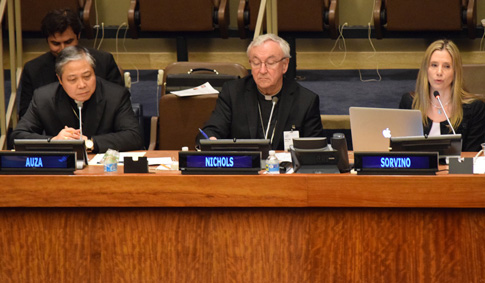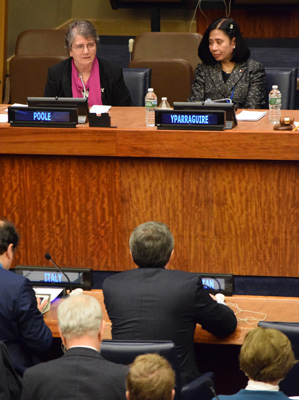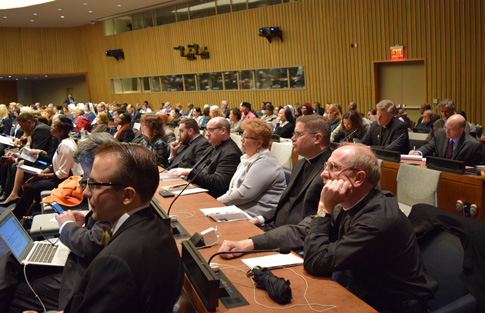
Global forces need to unite to eradicate forced labor, modern slavery and human trafficking. This was the urgent plea at a conference at United Nations Headquarters in New York April 7.
“The resurgence of slavery is one of the biggest tragedies of our time,” said Archbishop Bernardito Auza, the permanent observer of the Vatican to the UN. “It is a moral imperative to end human trafficking.”
The 21st century has the highest number of humans being traded around the world. According to experts at the conference, about 21 million people are being trafficked today – compared to the 12 million slaves during the trans-Atlantic slave trade of the 19th century.
The conference “Ending Human Trafficking by 2030: The Role of Global Partnerships in Eradicating Modern Slavery” was sponsored by the Permanent Observer Mission of the Holy See to the United Nations and the Santa Marta group, an international alliance of police chiefs and bishops around the world working with partners to eradicate human trafficking. The group was founded at Pope Francis’ request in 2014.
Speaking on behalf of the group, Cardinal Vincent Nichols of Westminster said the Church’s motivation to find the global evil of human trafficking is a commitment to the dignity of every human person rooted in a person’s God-given existence, which “needs to be protected and promoted in every circumstance and time.”
The heart of the work of the Church, Cardinal Nichols said, is “to look to, to rescue, to nurture, to comfort, to give freedom and a fresh start to the victims of trafficking.”
In a letter read at the beginning of the conference, Pope Francis encouraged the members of governmental, civic and religious organization to communicate and cooperate to end “the suffering of the many men, women and children who today are enslaved and sold as if they were a mere commodity.”
Kevin Hyland, the independent anti-slavery commissioner for the United Kingdom, said human trafficking today, is a human rights issue and an organized crime issue that generates $150 billion a year in illegal profits.
UN Goodwill Ambassador and actress, Mira Sorvino added that “government actions, NGOs, civil society and private sector all in unison” are needed to help human trafficking victims.

After the keynote speeches, panelists discussed the deeper causes of human trafficking and modern slavery, including the rejection of another person’s humanity, poverty that makes people more vulnerable to false promises of employment, corruption and greed from those who should be protecting people, as well as armed conflict and violence.
Sister Imelda Poole, I.B.V.M., president of Religious in Europe Networking Against Trafficking and Exploitation (RENATE), explained how religious congregations across 24 countries help victims and raise awareness about this crime against humanity.
Echoing other panelists, she asked people to think about how lifestyle choices can be creating a demand for this crime – which encompasses sexual exploitation, forced labor, slavery and servitude.
“When we are demanding cheap goods, cheap clothes, cheap services, who is paying the price of these?” she asked.
After the conference, retired Auxiliary Bishop Guy Sansaricq said he was heartened to hear panelists sharing their efforts to fight human trafficking. They showed a willingness to work together to relegate human trafficking to the history books, where it belongs.
“(Human trafficking) is a very serious problem and it is very important that people be made aware of the extent of the problem, so that we can fight it,” he said. “We cannot tolerate to allow so many people to be used for economic purpose, to be used as if they were objects.”
Reminding people of the human faces behind the numbers was panelist Donna Hubbard, a human trafficking survivor who spoke of the realities victims have to endure. She was sold to a pimp and became gang property on the streets of Los Angeles. She was “traded for sex, drugs, money and even weapons.” She could not run away as her captors threatened her with harming her children.
Her life started to change when she was in jail and discovered the Gospel. A turning point was when a compassionate officer asked her about her story and believed her. In 1994, she founded the Woman at the Well Transition Center, a nonprofit ministry to help formerly incarcerated persons. She was selected to serve on a committee to fight prostitution and sex trafficking in the Greater Atlanta area and is a consultant with the Office of Women’s Health addressing trauma impact on women.

“Because I survived trafficking,” she said, “it is my mission to help women to regain their lives, family and dignity.”
Hubbard is now a pastor and flight attendant who helps train people at Airline Ambassadors International so they can identify and report the signs of trafficking. Trafficking happens to everyone regardless of his or her color, gender, nationality or economic status, she added.
“You have it in your power to save a life and to change a life,” Hubbard said. “We can no longer ignore this.”
Father Patrick Keating, CEO of Catholic Migration Services, said this first-hand account offered a hopeful sign of being “able to overcome nothing less than a traumatic and horrific situation.”
“From those ashes rose a extremely powerful ministry that she has to help others,” he said. “Sometimes when we hear 30 million (people are affected), one can get lost in the numbers. But we know that by helping one person we are making a difference.”
Bishop Sansaricq highlighted the need to stay vigilant to be able to help any victim and to make sure the victim is not victimized any further by being treated as criminals, while the perpetrators are free.
“Every Catholic, every Christian must be involved in relieving suffering, especially in this Year of Mercy,” he said.
